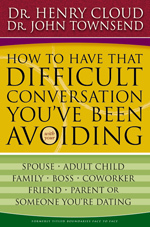Henry Cloud's Blog, page 29
August 28, 2014
What Does It Mean for a Christian to Be Free?
Sometimes we may hear that “freedom in Christ” means we are free from specific ceremonial practices of the Mosaic Law; that is, we don’t have to keep the rituals to be connected to God. However, real Christian freedom is more than just freedom from laws. It is freedom to choose life; freedom from fear, guilt and condemnation when we make a wrong choice; freedom to choose love.
By nature, we are not free. We are slaves to the law of sin and death (see Romans 7:14 – 15; 8:1 – 2). As long as we are under the law, we will fail—as much as we try not to and as good as our intentions may be.
If we trust Christ as our Savior, we are out from under the law of condemnation. When God looks at us, he sees the righteousness of Jesus (see 2 Corinthians 5:21). Legally, we are not guilty (see Romans 8:1). Through God’s grace, the consequence of sin for the Christian is never condemnation or punishment from God. Yet many of us have a hard time believing that grace is free and complete and we can’t do anything to add to it in any way (see Ephesians 2:8–9). We just cannot believe that God accepts us even in our failures.
Under the Law
In God’s grace, the law is intended to be a standard by which to evaluate ourselves. It helps us to see where we need to change. There are at least five major consequences when we put ourselves under the law:
1. Wrath. God is angry at offenses against him; it is part of his legal system, the law. That is why we need Jesus, the one who takes his wrath away (see Romans 4:15). But if we put ourselves under the law, we will be angry at God and ourselves.
2. Condemnation. We feel guilty and condemned if we do not do what we should. Yet we have been cleansed “once for all by [Christ’s] own blood” (Hebrews 9:12).
3. Separation from love. If we feel unloved when we do not do as we should, we are still under the law. God loved us while we were his “enemies” (Romans 5:10), before we were interested in doing as we should. Nothing we do can separate us from the love of Christ (see Romans 8:35 – 39). If we feel separated from God after trusting Jesus, we have put our selves back under the law.
4. Sin increases. If we feel we should do certain things because punishment awaits us if we don’t, we have not “died to the law” (Romans 7:4)—and the law will have power over us. “The law was brought in so that the trespass might increase” (Romans 5:20). In other words, the very method by which we are trying to change will produce failure. The more condemning voices we have inside, the harder it is to change a problem. Ask any addict.
5. No benefit. Whenever we do something because we feel we should or because we think we have to, it is of no benefit because our motivation is not love (see 1 Corinthians 13:1 – 3; 2 Corinthians 9:7). Only when we are free can we love freely.
A Life of Freedom
If we are not condemned for what we do or who we are, why not do whatever we want to do? “Shall we go on sinning so that grace may increase? By no means! We are those who have died to sin; how can we live in it any longer?” (Romans 6:1 – 2).
The Bible’s response to total freedom is a refusal to continue to live in destructive ways (see Romans 6:1 – 4). “By dying to what once bound us, we have been released from the law” and can now live “in the new way of the Spirit” (Romans 7:6). The Bible teaches that there are two paths — one that works and one that doesn’t. Both are reality: “The mind governed by the flesh is death, but the mind governed by the Spirit is life and peace” (Romans 8:6).
In salvation, we are reconciled to God through Christ (see Romans 5:10; 2 Corinthians 5:18 – 21). We are free to love and choose healthy ways of living. We do not have to love God or anyone else (see Joshua 24:15). But by looking in the mirror of God’s law, we realize that if we do not choose love, our lives will be empty. We begin to see that a life without fulfilling relationships has little meaning or fulfillment.
In relation to others, when we love them we give them total freedom as God gives us. We accept others, “just as Christ accepted [us]” (Romans 15:7). When they fail to love us or choose not to love us, we do not withdraw our love from them. We may confront them or express our sadness about their choice, but we do not condemn them.
And when we fail, we own our failure. With grace, we do not need to be defensive, for we are not condemned. Guilt says, “I should be different and if I’m not, then I’m bad,” so we get defensive. Grace says, “I see the standard and I’m not measuring up. I need help and love to change so that I can live.” We begin to seek God’s help to change. In a phrase, we “hunger and thirst for righteousness” (Matthew 5:6).
 Find more insightful commentary from Drs. Henry Cloud and John Townsend, read the NIV Life Journey Bible, which combines the world’s most accessible Bible translation with exclusive boundaries teaching.
Find more insightful commentary from Drs. Henry Cloud and John Townsend, read the NIV Life Journey Bible, which combines the world’s most accessible Bible translation with exclusive boundaries teaching.
The post What Does It Mean for a Christian to Be Free? appeared first on Boundaries Books.
August 24, 2014
Boundaries for Single Parents – 3 Tips to Save Your Sanity
 If you are a single parent, you may need to know something: you have the hardest job in the world. You have to meet all the needs of your kid, over many years, without the help of a spouse. Some of my (Dr. Townsend) closest friends are single parents, and my heart breaks with theirs when they encounter the rough years of parenting. Single parenting can sometimes be brutal and overwhelming. That’s why it’s important to discuss boundaries for single parents.
If you are a single parent, you may need to know something: you have the hardest job in the world. You have to meet all the needs of your kid, over many years, without the help of a spouse. Some of my (Dr. Townsend) closest friends are single parents, and my heart breaks with theirs when they encounter the rough years of parenting. Single parenting can sometimes be brutal and overwhelming. That’s why it’s important to discuss boundaries for single parents.
Many of my friends have also found the balance and resources they need, and they are experiencing success as parents. Their children and teens are doing well and are maturing at the right rate. So there is hope for you as well.
Let’s look at three of the biggest struggles single parents face and explore what you can do to meet those challenges:
Single Parent Challenge #1 – Not Enough of You
Single parents have to do the work of two parents, yet they have more limited resources than two-parent families, both in quantity and in ability. This limitation becomes more of a challenge when your kids are teenagers. They push against your authority and limits and assert their freedom in a million ways.
Parents who have a spouse can hand off their teen to the other parent when they are feeling worn out. My wife and I do this all the time. But you can’t do this as a single parent. If your teen doesn’t let up on you, you don’t get a chance to rest and regroup. This can be exhausting, and it’s easy to feel you don’t have any strength left inside to resist your kid’s resistance.
What can you do? The answer isn’t trying harder, or using your will power. Instead, realize that you don’t have what you don’t have. You will need to get from the outside what you don’t possess on the inside. You need to do this for your kid, and for yourself as well. Call a safe and sane friend and get your emotional tank filled, and then enter the ring again and resolve the issue.
It’s tempting for single parents to think, I am so tired. I just don’t have it in me to spend a lot of time talking with my kid. Besides, he’s almost an adult anyway, so he probably doesn’t even need a lot of me. While your teen is almost an adult, he still needs bonding time with you in order for him to feel safe and loved and to help him sort out the vagaries of teen life. So get some strength from others, so that you can stay attached to your teen.
Keep in mind that you may need to ask another adult, such as a mature friend, youth pastor, or counselor, to intervene. Your teen may be able to hear things from this other person that he refuses to hear from you. Regardless, get connected.
Single Parent Challenge #2 – Rescuing Your Kids From Failure
I recently asked a single mom who is a good friend of mine, “What do you think is the biggest mistake single parents make?” Without hesitating, she said, “Not allowing their kids to fail.”
My friend was talking about rescuing young kids and teens from experiencing their consequences. Parents who rescue their adolescents often do so out of guilt. They already feel bad about their kid’s situation, and often feel partially responsible that their child doesn’t have two parents in the home.
As a result, single parents often indulge their teen and don’t enforce the consequences that should come with attitude and behavior violations. They think, My teen already has a strike against her. I’ll make it up to her a little by being easy on her. However, this “solution” doesn’t solve the problem; it merely creates a second problem. Not only does the teen have to struggle with a broken home, it’s likely she will never develop any self-control. Kids from a single-parent family need limits just as much as any kid does.
Surround yourself with guilt-busters — that is, friends who will support you when your emotions tell you you’re being too mean. Cry on their shoulder, allow them to give you a reality check, and let them encourage you to love your teen and still hold the line.
I have a single-parent friend who always felt guilty whenever she grounded or took privileges away from her teens. But her kids have grown up, and they have come back to her and said, “Thanks for being strict, Mom. That’s why I can keep my own marriage and job together.”
Single Parent Challenge #3 – Parenting Differences With Your Ex
Many divorced parents differ in their parenting values. Often, a parent will notice that the child has a bad attitude or misbehaves after she has spent some time with the other parent. You can attribute some of that to the teen trying to adjust and transition between two worlds, and she needs your support and patience on that. But it may also be that your ex is not providing enough structure and consistent limits.
If this is your situation, do all you can to get your ex to agree to put your kid first and to come to an agreement on parenting values and styles. If your teen’s well-being is in jeopardy, you may even have to go the legal route for his protection.
If you see some negative effects when your teen spends time with your ex, but they aren’t serious enough for you to take legal action, then be the best parent you can be. Be balanced and integrated with love and boundaries. If your ex is a Disneyland parent, don’t be the hardnose, hoping to compensate. Your teen needs to be around someone whom she can take inside of herself, who is a picture of maturity, grace, and truth. Don’t try to get even with your ex. Get healthy.
Ask for Help
Finally, don’t try to be strong and go it alone. Ask for help from your kid’s school, your church, and your friends. Single parents need more help, and they should get more.
God has a special place for you and your children. In Psalm 68:5, King David wrote about how much God wants to provide for kids who don’t have both parents around: “A father to the fatherless, a defender of widows, is God in his holy dwelling.” Ask God for help, and He will give it to you.
 Recently, we received several requests for more information about boundaries for single parents. We wanted to honor those requests by sharing this excerpt from “Chapter 7 – For Single Parents” in Boundaries with Teens by Dr. John Townsend. In his book, you will find a lot more information for single parents, including a separate chapter dedicated to step-parenting.
Recently, we received several requests for more information about boundaries for single parents. We wanted to honor those requests by sharing this excerpt from “Chapter 7 – For Single Parents” in Boundaries with Teens by Dr. John Townsend. In his book, you will find a lot more information for single parents, including a separate chapter dedicated to step-parenting.
Click here to purchase your copy and get compassionate, insightful advice from Dr. Townsend. Boundaries make life better!
The post Boundaries for Single Parents – 3 Tips to Save Your Sanity appeared first on Boundaries Books.
August 21, 2014
The Two Sides of Life
For those who may not know, this website features 12 free teaching videos by Boundaries co-authors, Dr. Henry Cloud and Dr. John Townsend.
Today, we want to highlight a great video by Dr. Cloud that addresses the controversial question, “Can You Love Someone Too Much?” His video called “The Two Sides of Life” discusses the unseen balance between love and truth. Take the next 6 minutes to watch this video and learn an important secret that affects all of your relationships.

Click on the picture to view video:
The Two Sides of Life
To watch more of these insightful videos, click here.
The post The Two Sides of Life appeared first on Boundaries Books.
August 15, 2014
How to Love When You’re Out of Love
 I (Dr. Cloud) was once meeting with a couple who had given up hope in their relationship. I knew that they were at the end of themselves. From their perspective, divorce was the next option. At the same time, I knew that their problems were curable. I felt that we first needed to put this couple’s hopelessness on the table, so I asked, “Do either of you have any hope for this marriage?”
I (Dr. Cloud) was once meeting with a couple who had given up hope in their relationship. I knew that they were at the end of themselves. From their perspective, divorce was the next option. At the same time, I knew that their problems were curable. I felt that we first needed to put this couple’s hopelessness on the table, so I asked, “Do either of you have any hope for this marriage?”
“No, we don’t,” they both finally admitted.
Then I said something that threw them: “Good! Now we can get to work.”
“What do you mean?” they asked, surprised.
What they did not know was that I knew they both had a deep love for God and, although they were ready and willing to forsake each other, they were not ready to forsake Him. I trusted their faith in God. I knew that if they could stop lying to themselves about wanting to change “for the other,” we could get to someone for whom they would change: God. So I told them so.
“I think that both of you are so disappointed in each other and in your relationship that you have very little hope of solving your problems for each other. In reality, there is not enough love between the two of you to hold you together. I’m glad you are facing that reality, because deep down you both know it. But I know something else about you. You both love God enough to make the changes that He wants you to make, and if you do that, I promise you that you will do very well in your relationship. Will you both commit to that kind of love? Can you both commit to doing what God is going to ask of you in this process?”
Both said that they could, but both were downhearted about it. They thought that I meant that just because God says He is against divorce, I was asking them to remain faithful to Him and just stick it out in a miserable relationship. In a sense, I was. But I knew better than that. I knew that if they could submit to the changes God would ask them to make, the marriage would get better. But since they could not believe that, they had to take it on faith.
Jesus said that the greatest commandment is to love God “with all your heart and with all your soul and with all your mind and with all your strength” (see Mark 12:30). Why did He place this value above all others?
Although we could point to many reasons, one in particular relates to marriage. When loving God is our orienting principle in life, we are always adjusting to what He requires from us. When things get tough in a marriage and when some change is required from us, we might not want to do it. We might feel that it is unfair that we have to change, or it might be too difficult or painful to change. At those moments, it is much easier to just please ourselves. But if we know that it’s God with whom we ultimately have to deal, we submit to this reality and His higher calling to us to grow. In the end, the relationship wins.
The “hope-less” couple and I worked hard for a while. And they learned something. She learned that at times she would want to be judgmental of her husband but God said no. She would be very angry toward her husband, but she would submit to God and give up her judgmentalism.
At times, the husband would get so angry toward his wife that he would want to snap back with sarcasm, something he was very skilled at. But he knew that someone higher was asking him to deny himself that little treat. He would submit to God and bite his tongue.
At other times, he wanted to give in to the temptation to avoid listening to her complaints about him. He hated conflict. But he learned that God wanted him to listen and not react defensively. He would submit to God and remain in the conflict long enough to work it out. Before, he would turn to his hobbies and avoid her.
She learned as well that she had a lot of bitterness and fears in her own life for which she was blaming her husband. She found out that God wanted her to take responsibility for feelings with which she had never dealt, so she submitted to God and did the work of change. She got healthier.
Just recently, about a year after the hopeless conversation mentioned above, we had an interesting session. This couple did not have anything to work on. They were doing so well they had nothing to talk about!
She was a little giddy, reminding me of a teenager. “We are just having so much fun together! It is everything that I married him for in the beginning. I never thought we would be here.”
“I can’t believe what I was missing,” he joined in. “I just love being with her. None of that other stuff—mostly work—that I used to spend all of my energy on matters very much any more. I just want to be with her and talk.”
Then we reflected on where they had been a year earlier, when it had all seemed so hopeless.
“I did not know what to do,” one of them said, “so we just trusted you when you said there was a way out. And it worked.” I clarified something for them. “It may have seemed to you that you were trusting me. But in reality you weren’t. I was telling you that I knew that God’s ways worked and that, if you could do them, your relationship would work. You made that commitment to God, and both of you followed through with the day-to-day work that He asked you to do. When God asked you to grow and change, you submitted to Him. And now you have the fruit that God promises. You might have thought that you were trusting me, but I was just representing Him. When you committed to follow Him and whatever He showed you, I knew that you would make it.”
It was a neat moment. I have no doubt that they will make it now for the rest of their lives. They now have a real love between the two of them that they did not have before. But it came as a result of “loving God.” They loved God enough to do what He asked of them, and they grew to love each other as a result. The love that they now have for each other is a fruit of loving God.
This is why loving God must be first. He empowers us to change. He tells us how to change. Most of all, God becomes the one that keeps us from being ultimately in charge. If we try to be in charge, we will do it our way, and then our own limitations become the limitations of the relationship as well. We all need someone bigger to answer to so we will make the changes we need to make. Love God first, with all of your heart, mind, soul, and strength. Lose your life to Him, and you will gain it.
 If your marriage is struggling or you want to make a great marriage even better, Boundaries in Marriage has the answers. Learn how to:
If your marriage is struggling or you want to make a great marriage even better, Boundaries in Marriage has the answers. Learn how to:
Transform your relationship into a haven of mutual love, caring, and appreciation.
Protect your marriage from intruders, whether parents, affairs, or addictions.
Handle conflict effectively without losing your voice in the relationship.
Develop a sense of closeness and respect that you’ve never felt before.
Click here to read a sample chapter, watch a free video, and purchase your copy today.
Image courtesy of nuttakit at FreeDigitalPhotos.net
The post How to Love When You’re Out of Love appeared first on Boundaries Books.
August 14, 2014
Facebook Can’t Beat Face-to-Face Connections
 When people have a healthy and honest friendship, Facebook is a great way to stay in touch because it is so convenient and efficient.
When people have a healthy and honest friendship, Facebook is a great way to stay in touch because it is so convenient and efficient.
However, the other side is true as well. If a relationship is struggling, it’s hard to fix it over a digital connection. Anything negative or confrontational seems much worse when you read it. I tell people to not confront each other digitally at all, as it is easy for the responder to feel attacked or judged.
Facebook is a way to connect, but face-to-face has not yet been matched in relationships. It’s important to connect with friends in person.
– Wise words from Dr. John Townsend on his Facebook page. Read more here.
The post Facebook Can’t Beat Face-to-Face Connections appeared first on Boundaries Books.
August 10, 2014
Is Complying the Same as Lying?
 Many Christians fear that setting and keeping limits signals rebellion or disobedience. In religious circles you’ll often hear statements such as, “Your unwillingness to go along with our program shows an unresponsive heart.” Because of this myth, countless individuals remain trapped in endless activities of no genuine spiritual and emotional value.
Many Christians fear that setting and keeping limits signals rebellion or disobedience. In religious circles you’ll often hear statements such as, “Your unwillingness to go along with our program shows an unresponsive heart.” Because of this myth, countless individuals remain trapped in endless activities of no genuine spiritual and emotional value.
The truth is life-changing: a lack of boundaries is often a sign of disobedience. People who have shaky limits are often compliant on the outside, but rebellious and resentful on the inside. They would like to be able to say no, but are afraid. So they cover their fear with a half-hearted yes.
Take Barry for example. He had almost made it to his car after church when Ken caught up with him. Here goes, Barry thought. Maybe I can still get out of this one.
“Barry!” Ken boomed. “Glad I caught you!” The singles class officer in charge of Bible studies, Ken was a dedicated recruiter to the studies he presided over; however, he was often insensitive to the fact that not everyone wanted to attend his meetings. “So which study can I put you down for, Barry? The one on prophecy, evangelism, or the book of Mark?”
Barry thought desperately to himself. I could say, “None of the above interest me. Don’t call me—I’ll call you.” But Ken is a ranking officer in the singles class. He could jeopardize my relationships with others in the group. I wonder which class will be the shortest?
“How about the one on prophecy?” Barry guessed. He was wrong.
“Great! We’ll be studying end times for the next 18 months! See you Monday.” Ken walked off triumphantly.
Let’s take a look at what just happened. Barry avoided saying no to Ken. At first glance, it looks like he made a choice for obedience. He committed himself to a Bible study. That’s a good thing, right? Absolutely.
But take a second look. What were Barry’s motives for not saying no to Ken? What were the thoughts and attitudes of his heart? Fear. Barry was afraid of Ken’s political clout in the singles group. He feared that he would lose other relationships if he disappointed Ken.
Why is this important? Because it illustrates a biblical principle: an internal no nullifies an external yes.
God is more concerned with our hearts than he is with our outward compliance. “For I desire mercy, not sacrifice, and acknowledgment of God rather than burnt offerings” (Hosea 6:6).
In other words, if we say yes to God or anyone else when we really mean no, we move into a position of compliance. And that is the same as lying. Our lips say yes, but our hearts (and often our half-hearted actions) say no. Do you really think Barry will finish out his 18 months with Ken’s Bible study? The odds are that some priority will arise to sabotage Barry’s commitment, and he’ll leave — but without telling Ken the real reason why.
Here’s a good way to look at this myth that boundaries are a sign of disobedience: If we can’t say no, we can’t say yes. Why is this? It has to do with our motivation to obey, to love, or to be responsible. We must always say yes out of a heart of love. When our motive is fear, we love not.
The Bible tells us how to be obedient in 2 Corithians 9:7, “Each of you must give as you have made up your mind, not reluctantly or under compulsion, for God loves a cheerful giver.”
Look at the first two ways of giving: “reluctantly” and “under compulsion.” They both involve fear—either of a real person or a guilty conscience. These motives can’t exist side by side with love, because “There is no fear in love; but perfect love casts our fear” (1 John 4:18). Each of us must give as we have made up our minds. When we are afraid to say no, our yes is compromised.
God has no interest in our obeying out of fear because, “Fear has to do with punishment. The one who fears is not made perfect in love” (1 John 4:18). God wants a response of love.
Are boundaries a sign of disobedience? They can be. We can say no to good things for wrong reasons. But having a “no” helps us to clarify, to be honest, to tell the truth about our motives; then we can allow God to work in us. This process cannot be accomplished in a fearful heart.
 Is it possible to set limits and still be a loving person? Absolutely! You don’t have to be controlled by fear or guilt. Read the award-winning book, Boundaries, and learn when to say yes and how to say no in a way. Drs. Henry Cloud and John Townsend provide practical, biblically-based solutions that help enhance all of your relationships.
Is it possible to set limits and still be a loving person? Absolutely! You don’t have to be controlled by fear or guilt. Read the award-winning book, Boundaries, and learn when to say yes and how to say no in a way. Drs. Henry Cloud and John Townsend provide practical, biblically-based solutions that help enhance all of your relationships.
Incredible Summer Special:
Get the Boundaries paperback book for only $5.00 at the FaithGateway store. Don’t wait…this is a limited-time offer.
Compliance image by Stuart Miles courtesy of FreeDigitalPhotos.net
The post Is Complying the Same as Lying? appeared first on Boundaries Books.
August 7, 2014
Boundaries With Feedback
 Business management expert, Ken Blanchard, says that feedback is the “breakfast of champions.” There is no doubt about that, as learning how we are doing and how to do better are key to any performance. In fact, the best performance situations are when we are getting the most immediate feedback, which is from the task itself, as flow researcher Mihaly Csikszentmihalyi has found.
Business management expert, Ken Blanchard, says that feedback is the “breakfast of champions.” There is no doubt about that, as learning how we are doing and how to do better are key to any performance. In fact, the best performance situations are when we are getting the most immediate feedback, which is from the task itself, as flow researcher Mihaly Csikszentmihalyi has found.
The problem tends to occur at the moment when we actually get the feedback, either from other people or from the outcomes themselves. That is when our leadership character shows itself. While Blanchard gets it exactly right about the kind of breakfast we need, truth is that not everyone has the same appetite for breakfast. Some people wake up and really want it, while it makes others sick to their stomachs. Some are allergic to feedback. They set boundaries against constructive criticism.
Brain research shows that feedback can do funny things to us if we see it as a danger or a put-down. We go into the “moving away” or “moving against” mode of fight-or-flight. The brain gets biochemically goofy. That is why you see people get so defensive and go to great lengths to fight any feedback. But remember, fight-or-flight only comes when there is a perceived danger. Therein is the rub. If we see feedback as dangerous, we will bristle and fight it. But if we perceive feedback as an unexpected windfall, like winning the lottery, we will seek it out and be open to it, and sometimes even pay for it. That is what good character does… it hungers for feedback.
To be the best you can be, you must develop a hunger for feedback and see it as one of the best gifts you can get. It is part of being an open system and has incredible value not only to you but also to your people.
I was conducting a leadership offsite where the executive team members responsible for the agenda had asked me to try to maneuver the conversation toward a topic they all wanted to discuss but didn’t want to state explicitly on the agenda. After a lot of discussion about why I had to “maneuver” it that way instead of just intentionally designing it that way, the team confessed that their real goal was to sneak some tough feedback about the CEO onto the agenda – but in a way that would not throw him off or make him defensive. They feared that if the agenda were openly designed to give him feedback, it would never work. They hoped I would be able to “go there if the mood was right.” How sneaky, a lot of pressure, and not a lot of hope for success, I thought. I told them I understood their concerns but that I had a different plan to get the CEO into the right zone.
So at the beginning of the meeting, I explained the “physics of leadership” and the importance of the Second Law of Thermodynamics, mentioned above. I explained why it is important for senior leaders to be an open system and model receiving feedback well in organizations, and I emphasized that being open to feedback is a key indicator not only of leadership aptitude but also character. Good character welcomes feedback and foolish character fights it off.
I don’t know whether it was these comments of the mood – or whether the team had just misread the CEO – but when the time came for “saying things that are hard to say, but necessary for the good vision,” one of the members of the executive team had the courage to wade in. He told the CEO that there were some things that they needed from him that they were not getting, and that there were some things in his leadership style that was leaving the team and the organization with some gaps in performance. I watched and held my breath, waiting for the whole retreat to blow up before my eyes. (I love these moments, though. They can be some of the most powerful.)
The CEO listened as this tough feedback came at him in front of his whole team. And he did what the great leaders do: He received it, and he thanked them for it.
They looked stunned. But what was amazing was the discussion that followed. The CEO talking about his own passions, and the strengths and weaknesses that made him lead that way. His candor broke the logjam, and the team was able to come together and offer ways to help the CEO deal with his challenges. What made it happen was the CEO’s receptivity to hearing what his stakeholders had to say – his willingness to embrace it and make changes. And part of what made him receptive was hearing from me, an outsider, that it was more than ok – it was normal and even desirable – to hear and receive feedback. Now, four year later, the team still refers to that moment as “the retreat where we got honest.” It was the beginning of a shift in the entire culture, ignited by the CEO’s openness to feedback.
What is your appetite for feedback? Do you get defensive or receptive?
 Overcome your fear of feedback and learn why some people get results when others don’t. Get the must-read leadership book for individuals and organizations by Dr. Henry Cloud, Boundaries for Leaders.
Overcome your fear of feedback and learn why some people get results when others don’t. Get the must-read leadership book for individuals and organizations by Dr. Henry Cloud, Boundaries for Leaders.
Photo courtesy of Stuart Miles at FreeDigitalPhotos.net
The post Boundaries With Feedback appeared first on Boundaries Books.
August 3, 2014
Boundaries and The Beverly Hillbillies
 When setting boundaries with someone, it’s important to differentiate between what you prefer and what’s actually wrong. Before you talk to someone about changing his behavior, figure out if what he is doing is really a “bad” thing or just something you don’t like.
When setting boundaries with someone, it’s important to differentiate between what you prefer and what’s actually wrong. Before you talk to someone about changing his behavior, figure out if what he is doing is really a “bad” thing or just something you don’t like.
I (Dr. Cloud) refer to this distinction as a test I like to call “Would God and the Beverly Hillbillies Agree?” Here’s what I mean: Some things are just things you don’t like and want someone to change, but that person is not really doing anything wrong. Depending on where you come from, it may be acceptable or not.
For example, what is fine to Jed Clampett, the funny patriarch on the old Beverly Hillbillies television show, might be very distasteful to you. He was the kind of person who would keep a raccoon inside his house and stock his swimming pool with catfish. If your spouse did that, it would really bug you. It is all a matter of taste.
In contrast, mistreating people or not taking responsibility for one’s actions or morals, both God and even most hillbillies would say is wrong. There is little disagreement about those behaviors.
Before you proceed setting boundaries, figure out if what you are bugged about is in the “Preference” category or in the “Wrong for civilized humans” category. If it is just your preference, realize that you don’t have a “higher moral ground” from which to speak. Instead, you are really asking for a favor.
Failure to make this distinction commonly happens in a relationship in which one person is more structured than the other. One may be more orderly, time-conscious, budgeted, or organized than the other. The less structured one is looser and okay with things being more “unraveled.”
Typically, the structured one feels that her way is the “right” way and approaches the conversation in that fashion. This is usually a disaster. Instead of demanding better behavior from her spouse, what she should be doing is asking for a favor to negotiate a compromise—just asking the other person to come her way a bit.
Remember, ask as though you don’t have a “right” to what you are asking for. Preserve the freedom of the other person to say no or to disagree; and do not judge. Then, you will have a greater chance of getting what you want. As Jed Clampett used to say, “You’ll be happier than an itchy pig rubbing against a rail fence.”
 Setting healthy boundaries improves relationships and helps solve important problems. But, many of us don’t know how to have difficult conversations and see confrontation as scary or adversarial. If you feel hesitant about establishing limits with another person, get solutions in the book, How to Have That Difficult Conversation You’ve Been Avoiding. Dr. Henry Cloud and Dr. John Townsend will help you:
Setting healthy boundaries improves relationships and helps solve important problems. But, many of us don’t know how to have difficult conversations and see confrontation as scary or adversarial. If you feel hesitant about establishing limits with another person, get solutions in the book, How to Have That Difficult Conversation You’ve Been Avoiding. Dr. Henry Cloud and Dr. John Townsend will help you:
Understand essentials of a good boundary-setting conversation.
Prepare effectively for an uncomfortable or awkward conversation.
Tell other people what you want, stop bad behavior, and deal with counterattacks.
Click here to read a sample chapter and purchase today.
The post Boundaries and The Beverly Hillbillies appeared first on Boundaries Books.
July 31, 2014
Setting Boundaries at Work
 While I (Dr. Cloud) was consulting with one of the biggest companies in North America, an employee told me, “We would be so much better off if my boss would set better boundaries on what goes on with individuals on our team. He plays the ‘nice guy’ role too much, and as a result, the team suffers.”
While I (Dr. Cloud) was consulting with one of the biggest companies in North America, an employee told me, “We would be so much better off if my boss would set better boundaries on what goes on with individuals on our team. He plays the ‘nice guy’ role too much, and as a result, the team suffers.”
Surprisingly, a lack of confrontation goes in the other direction as well. One vice president told me something I hear often as a consultant: “I wish my people would come clean with me. I wish they would tell me what they really think. I wish they would be more open and direct. But they are scared to do that.”
If you are like most people, you spend a lot of your life at work. Work is a place with many possibilities for stress, conflict, risk, and loss. It is a place where you put in the best of who you are. You are serving, and at times sacrificing, trying to please, and also establishing friendships on the teams with whom you work. So it naturally follows that you can experience some emotionally trying times there.
In addition, you have a job to do. Sometimes, in the course of doing your job, you have to establish boundaries with other people who are not doing their jobs well. They may be your colleagues or people you manage and supervise or your supervisors and bosses. Much rides on your ability to communicate well. It may make a difference not only in how you feel on the job, but also whether your company or department performs well.
Understanding Task and Relationship
When you look at leadership research, management theory, and all the things that have ever been studied about how good work environments operate, two areas always emerge: task and relationship. Work has to do with getting a job done (the task) and getting along well with the people who are doing the task (the relationship). We work hard at tasks, and we do that with other people. It’s important that the two work together.
Both of these areas depend on establishing good communication and confrontation skills. To get a job done, we have to solve problems and “face” things. To get along well, we have to work out relational issues with each other through facing things as well. So the entire arena of work requires good confrontation skills to work well. Confront well, and you will work better also. The best teams, and the best work cultures are those that confront well.
Tips for Confronting and Setting Boundaries at Work
People are afraid to confront those over them as well as those under them. Often there are accountability structures established at work, and policies in place streamline interactions along the chain of command. The problem is more often that people don’t confront rather than that they can’t. That is why I regard a lack of confrontation as more of a personal issue than a “work” or “authority” issue. What can you do? Here are some helpful tips for confronting people at work.
1. Find out what formal communication policies guide how things are dealt with. Some things, such as sexual harassment, fall outside of the realm of talking to your co-worker; they require a formal procedure. Your human resources department or your supervisor will probably be able to help you there.
2. If there is no formal communication structure in place, the good old-fashioned way of finding this out is to ask. Ask your boss or supervisor how she would like you to handle talking to her about issues the two of you encounter. For example:
“Lynn, I want to have the best working relationship we can, and I want to do the best job possible for you. How do you want us to talk about things when an issue arises between us? Do I have the freedom to be really direct and clear about how we are doing together? Do I have to worry that I will be in trouble? How often would you like for us to ‘check in’ with each other to clean up lingering issues? Or do you have a preference for less structured meeting times and dealing with issues as they come up?”
Those are probably more questions than you want to ask, but you get the idea. Many times, just talking to a boss or supervisor about how the two of you want to work with each other is very helpful.
3. Go to your co-worker and talk directly about how the two of you should resolve conflict or solve problems. Putting it into a “solving problems” mode is probably less threatening. Have a talk over lunch or at a coffee break about how to do that, before there is an issue, if possible. Coming up with the ground rules and expectations beforehand is key. Covenant with each other to keep short accounts and to help each other by giving feedback.
Communicate Your Boundaries with Co-workers
Years ago, I walked into the office, and one of our employees (lets call her Susie) was crying. I asked her what was wrong, and she just shook her head no, as if to say she couldn’t talk about it. I pressed, though, as it was clear she was in a lot of distress.
“I just don’t know what to do,” she said. “Bill keeps asking me to do favors, and I can’t get my work and his done, too. I don’t know if I can work here anymore.”
“What is he doing?”
“He dashes out the door and asks me if I could ‘just drop something by at the printer’ for him, as he has an important meeting to go to.”
“Have you told him you can’t?” I asked.
“I say I don’t have time, but he just says it won’t take long and it would really help him, so I do it. Saying no hasn’t helped.”
“Well, saying it might not, but doing it would. I know Bill, and I would suggest a twofold approach. First, why don’t you tell him what this feels like to you? Tell him that you want to help, but you have too much of your own work to do and you can’t help him out anymore. Then tell him that you think he probably doesn’t know how this is affecting you. Tell him that you are so troubled by the trap you feel you are in that you are thinking of quitting. Tell him how hard it is to be under that pressure and that it is affecting your whole outlook on working here.”
She did confront him, and the outcome was great. While poor at seeing how his favors were too much to ask, he was good at responding to how others feel. He heard her and was saddened that he had made her work life so difficult for her.
Often, if you can be clear about a problem’s effect on you, and if you can help the other person see that this is the reason you are talking about it, you can resolve it. When you express how you are being hurt by something, as opposed to how someone else is “wrong,” many co-worker issues go away. Teamwork begins with understanding how we can help make one another’s load lighter.
People feel the need to address many different topics. Only you know what your issues are, but here are some common “talks” you might need to have at work:
“I feel like I am pulling more than my share of the weight. . . .”
“You interrupt me a lot. . . .”
“Please turn down your radio. . . .”
“I can’t find you when I need you. . . .”
“I need for you to get back to me sooner. . . .”
“I have to wait long periods of time for you to get things to me we have agreed on. . . .”
Certainly there are many more issues, but what they all have in common is that another person is working in a way that affects you and your work. Since you are not the boss, instead of evaluating someone’s performance, share how you want things to work better between you and the other person so you can work more effectively. If you can face your co-worker and use the principles focusing on how it affects you and the task, you will have a greater chance at resolution.
 If setting boundaries at work has you stressed out, find solutions in How to Have That Difficult Conversation You’ve Been Avoiding and Boundaries for Leaders.
If setting boundaries at work has you stressed out, find solutions in How to Have That Difficult Conversation You’ve Been Avoiding and Boundaries for Leaders.
Image courtesy of franky242 / FreeDigitalPhotos.net
The post Setting Boundaries at Work appeared first on Boundaries Books.
July 27, 2014
Why Smart People Accept Unacceptable Behavior
 When I (Dr. Townsend) guide people through a process of examining a previous difficult relationship, the one question I have found most helpful is this: What was the “payoff” in your choice? In other words, what good things did you think you’d get when you began a relationship with that person?
When I (Dr. Townsend) guide people through a process of examining a previous difficult relationship, the one question I have found most helpful is this: What was the “payoff” in your choice? In other words, what good things did you think you’d get when you began a relationship with that person?
We wind up with difficult people for a reason—there was something we valued, wanted, or hoped for. And because the need was strong, we may not have paid attention to something unacceptable in that person’s character. We either minimized or denied some sign, some reality, some warning light that all was not well. And the character problem ended up being a bigger deal than we thought.
When smart people accept unacceptable relationships, they tend to see traits and abilities in others that they think will make life better for them. We see positive aspects of a person’s psyche that we are drawn to or feel we need. A longing for them dulls an awareness of that person’s darker side. Here are a few examples. For some period of time in the relationship, the person had the following:
Warmth: She was gentle and nurturing with me
Affirmation: He saw the good in me
Safety: He did not condemn or judge me
Structure: She was organized and got things done
Humor: She helped lighten the burdens and cheered me up
A great family: His relatives were much healthier than mine
Drive: She was focused and knew where she was going
Initiative: She took risks and was brave in making decisions
Competency: He was talented, and I needed his talent in my organization
People skills: He handled people better than I did, so I depended on him
Intelligence: She was smart, and I needed smarts in my department
In the toughest cases, the trait is simply that “he liked me.” That is, sometimes people feel so alone and desperate that they are grateful just for someone to be pursuing them, no matter what that person’s character may be.
We have an ability to spin the truth when it comes to our relationships. When we want something so badly that we ignore reality. Love is not blind, but desire can be. Here are some examples of how we spin the truth:
You allowed him to control you because you were weak and afraid.
You ignored detachment and disconnection because she was a nice person.
You minimized irresponsibility because she had a great personality and charm.
You put up with his tendency to divide people on the team because he was a good strategist.
You didn’t pay attention to childishness because she was needy, and you felt protective.
You let him into your life because you were compliant and guilt-based, and he was free and a rebel.
Do you see how the problem occurs? It is an insidious process. It tends to occur slowly over time. The good aspects are generally apparent and right out there. The bad ones don’t come out until later, when the euphoria wears off and the honeymoon is over. We are simply not aware of the repercussions while we are in the middle of the relationship. Instead, we are focused on solving problems, improving things, questioning our own judgment, and trying to be positive about it all. It’s not until later, after we have some distance, that we can gain clarity and perspective on the true dynamics of what went on.
Here are a few questions to help you review your relationships and gain some helpful insights:
What drew me to this person?
What led me to think this person had what I needed?
When did I first notice a significant problem in the relationship?
How did I minimize the problem in order to get the good from the person?
What was the result of minimizing the problem?
The information you gather here will help you avoid these issues in future relationships. This doesn’t mean that the other person has some plan or agenda to hook you in. This occurs sometimes, but certainly not always. In most cases, difficult people are responding to their own issues but remain unaware of them or the impact they have on others. I say this to prevent you from feeling like you were sucked into a trap. Most of the time, both parties are in a dysfunctional dance, and neither one knows what’s going on. The difference now is that you can choose to stop dancing so that your future will be better than your past!
 If you’ve been burned by a bad relationship, don’t let the past repeat itself. Read Beyond Boundaries and discover how to tell who you can trust and learn the keys to know when you’re in a healthy relationship.
If you’ve been burned by a bad relationship, don’t let the past repeat itself. Read Beyond Boundaries and discover how to tell who you can trust and learn the keys to know when you’re in a healthy relationship.
Image courtesy of photostock at FreeDigitalImages.net
The post Why Smart People Accept Unacceptable Behavior appeared first on Boundaries Books.



